♦ 🐆 9 min, 🐌 18 min
🔬 Monthly experiment 10 2020
Hey There.Welcome back. To the new monthly newsletter format. To get it out of the way ASAP.Why the new format?
I want to go more in-depth with a few specific topics. It takes time to write a long, high-quality article and doing it every week is just not possible with the daily job and all.If you liked the four short articles a month format. Shame. I noticed that brief newsletters are too easy to consume. I've been reading productivity and self-improvement stuff for years now, and I noticed that short articles just scratch the surface of the topic. They give you the sense that you learned something, but you actually didn't. It would be kind of ironic for me to stick with the short format after this realisation.But I don't have the time and attention to read long stuff.Well, time is your problem. Attention is on me. If I make the first few short paragraphs interesting enough, you'll keep reading, no worries. Otherwise, I failed. The whole point of this newsletter is to teach you something and to convince you to move your ass a little bit. Not just consume. You can use social media for mindless consumption.Alright, so how will I keep you entertained this time? We'll cover a few different but in my opinion slightly unconventional topics:- Why the new format?
- Did the creative sabbatical work?
- What happened?
- Daily experiments
- Daily vacations
- Habit formation
Did the creative sabbatical work?
Hell yes. I had plenty of days like this: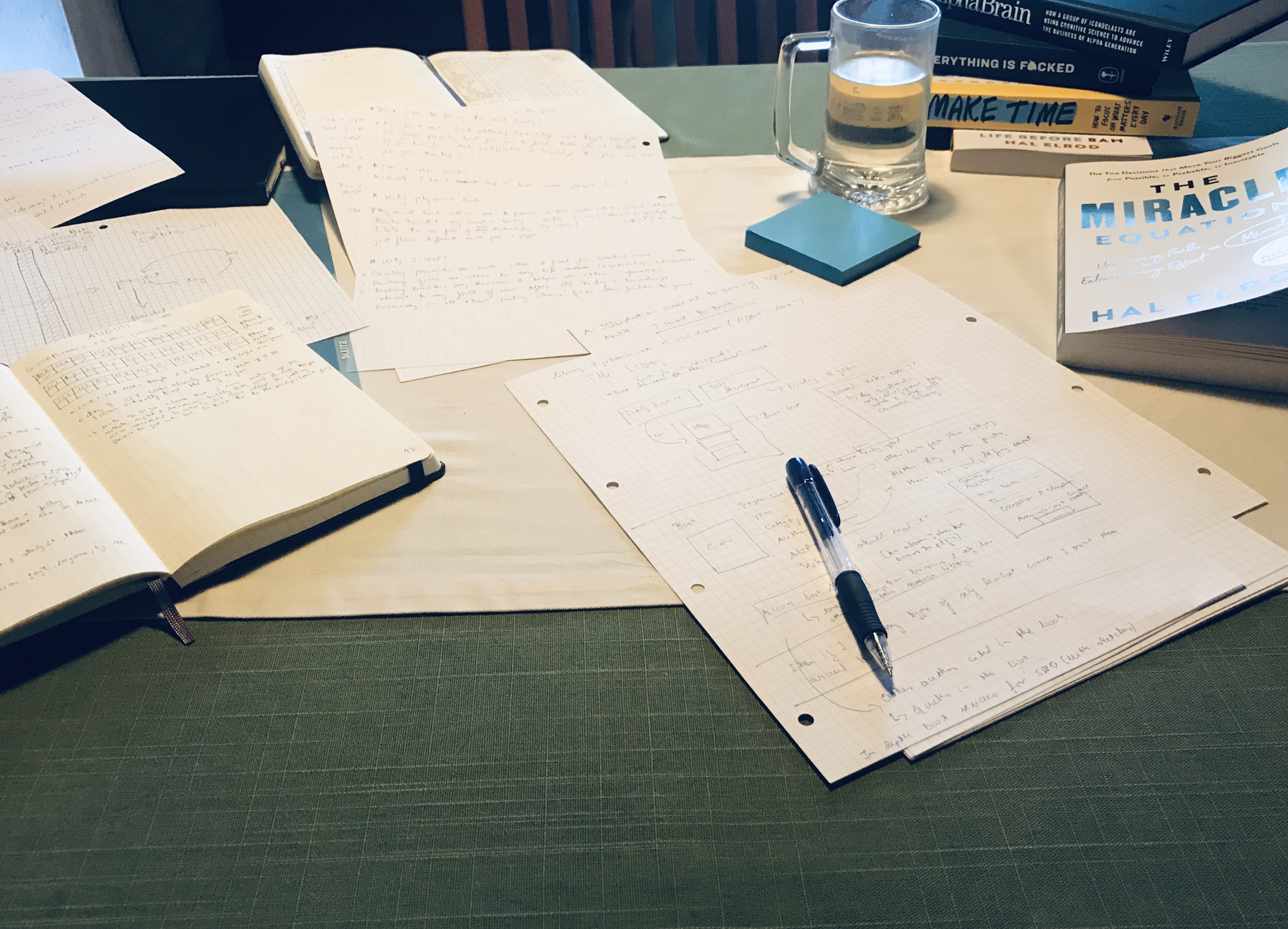 where creativity was sparking all over the place.I mentioned briefly in the last newsletter that I needed a break from all this forced weekly creativity. I had to force myself to write a newsletter each week. Which was the total opposite of what the newsletter was supposed to be. A channel I use to share my learnings and ideas. Yet it became a source of stress.I was neck-deep into the process and I forgot what the whole point of my writing was. Then I was one day in the tea house doing my usual writing and complained to the waiter that I have a bit of creative block. The waiter pointed out the obvious: "Well, how about a break and things will come naturally."At that moment, I was like "crap" I have to stop, pause and reflect. The rabbit hole I got caught in was a prime example of a situation where we are a bit overworked, tired and stressed, and we switch to autopilot and just keep pushing and pushing. As you may have noticed, I took a break.In the first month with zero obligations besides work, I closed the rest of the open projects and made sure that my free time was actually free.Then in August, I started cleaning all the piles of ideas that were all over the place. I didn't force myself, but I just gave my mind permission to wander (which you should absolutely do from time to time). Reading self-development books instead of short articles helped a lot in coming up with new ideas.Then September came, and it was time to start working on a few new ideas (like this newsletter and the next, the company set up, daily experiments, vacations, ...). So yeah:Take a break if you're stuck.As obvious as it is, we tend to forget about simple approaches and try to overcomplicate things. Or maybe that's just me.
where creativity was sparking all over the place.I mentioned briefly in the last newsletter that I needed a break from all this forced weekly creativity. I had to force myself to write a newsletter each week. Which was the total opposite of what the newsletter was supposed to be. A channel I use to share my learnings and ideas. Yet it became a source of stress.I was neck-deep into the process and I forgot what the whole point of my writing was. Then I was one day in the tea house doing my usual writing and complained to the waiter that I have a bit of creative block. The waiter pointed out the obvious: "Well, how about a break and things will come naturally."At that moment, I was like "crap" I have to stop, pause and reflect. The rabbit hole I got caught in was a prime example of a situation where we are a bit overworked, tired and stressed, and we switch to autopilot and just keep pushing and pushing. As you may have noticed, I took a break.In the first month with zero obligations besides work, I closed the rest of the open projects and made sure that my free time was actually free.Then in August, I started cleaning all the piles of ideas that were all over the place. I didn't force myself, but I just gave my mind permission to wander (which you should absolutely do from time to time). Reading self-development books instead of short articles helped a lot in coming up with new ideas.Then September came, and it was time to start working on a few new ideas (like this newsletter and the next, the company set up, daily experiments, vacations, ...). So yeah:Take a break if you're stuck.As obvious as it is, we tend to forget about simple approaches and try to overcomplicate things. Or maybe that's just me.What happened during those three months?
Since our last newsletter in June, I vowed not to open any new projects. I closed a few projects and significantly simplified my digital world. Why?I noticed that things started slipping out of my control. Which is a no-no for a control freak like me.Sure I've come up with a lot of new ideas, but this time I didn't immediately start working on them. I stored them into the Idea Brewery. Idea brewery is part of my new system to manage the creative mess and project order: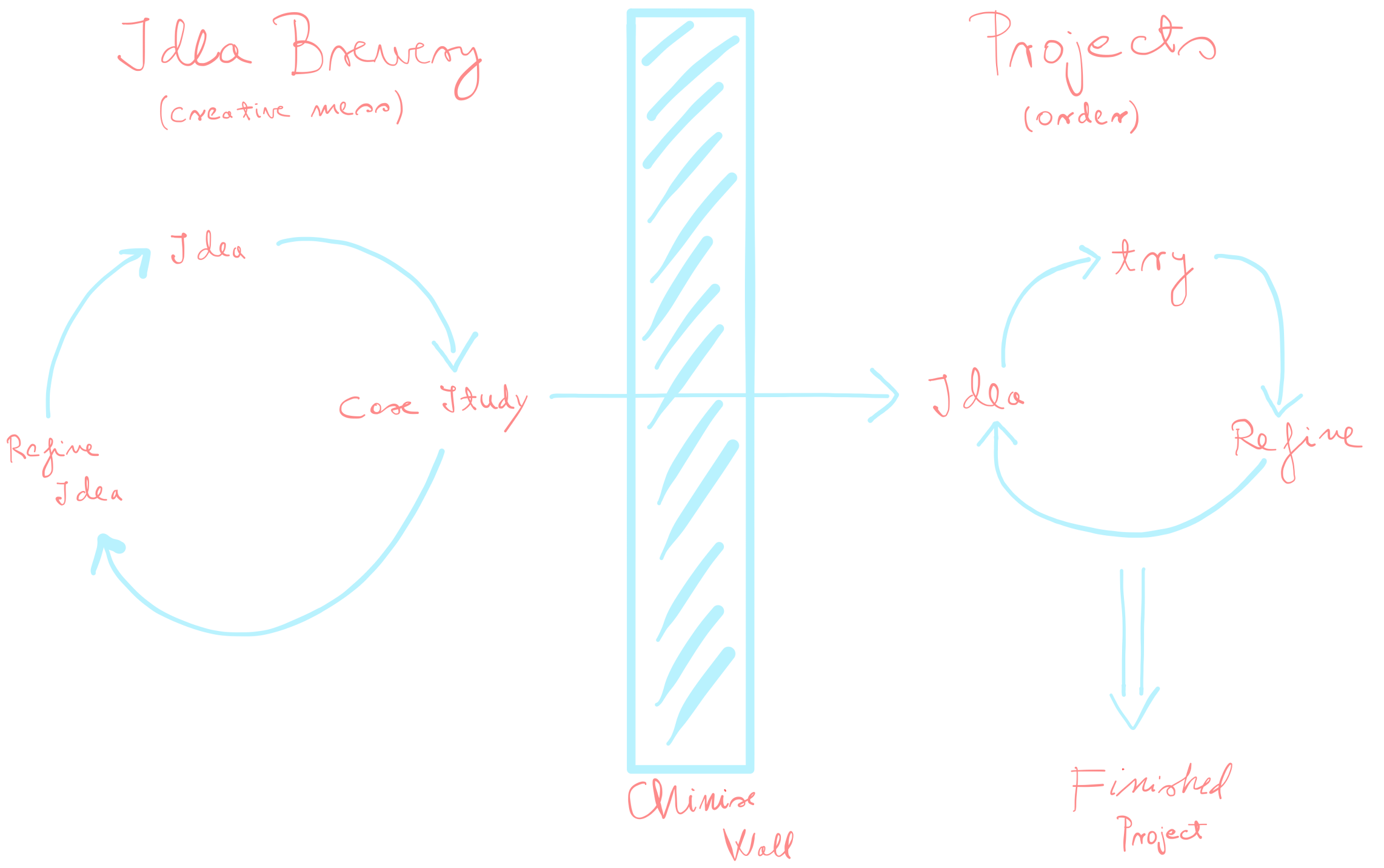 The basic idea is that we have a folder on the PC for all the ideas, maybe to-read articles, books, ... The rest of the projects/folders we have on the PC are projects we are working on. This way, the creative mess is localised to one place on our computer. Everywhere else we have military order. That's it. More details on the above system will be covered in the upcoming November newsletter.So what happened besides that?
The basic idea is that we have a folder on the PC for all the ideas, maybe to-read articles, books, ... The rest of the projects/folders we have on the PC are projects we are working on. This way, the creative mess is localised to one place on our computer. Everywhere else we have military order. That's it. More details on the above system will be covered in the upcoming November newsletter.So what happened besides that?- PhD work is going pretty well. It sucks a bit that I had to skip all of the summer conferences due to corona, but since the consequence was a large amount of focus, I'm not complaining too much.
- I finally started putting together papers needed to open my company. I've been procrastinating on this for toooo long.
- Handed over the steering wheel of the Help my Neighbour project.
- Read plenty of books. OK, only a few if you ask my dad.
- Tried a tone of new daily, weekly experiments.
- Got back to my 22:00 6:00 sleep schedule.
- Daily experiments and
- Daily vacations.
Daily experiments
A large part of my 3-month creative break (besides work and sleep), were daily experiments. I'm not talking about the kids' stuff we discussed in the past but a bit more hardcore experiments. I'm talking about systematically running several experiments a day. Change that, change that, ...The process is actually quite simple. At the end of the day, you just go through your day and think about what you did differently today than usually and write it down: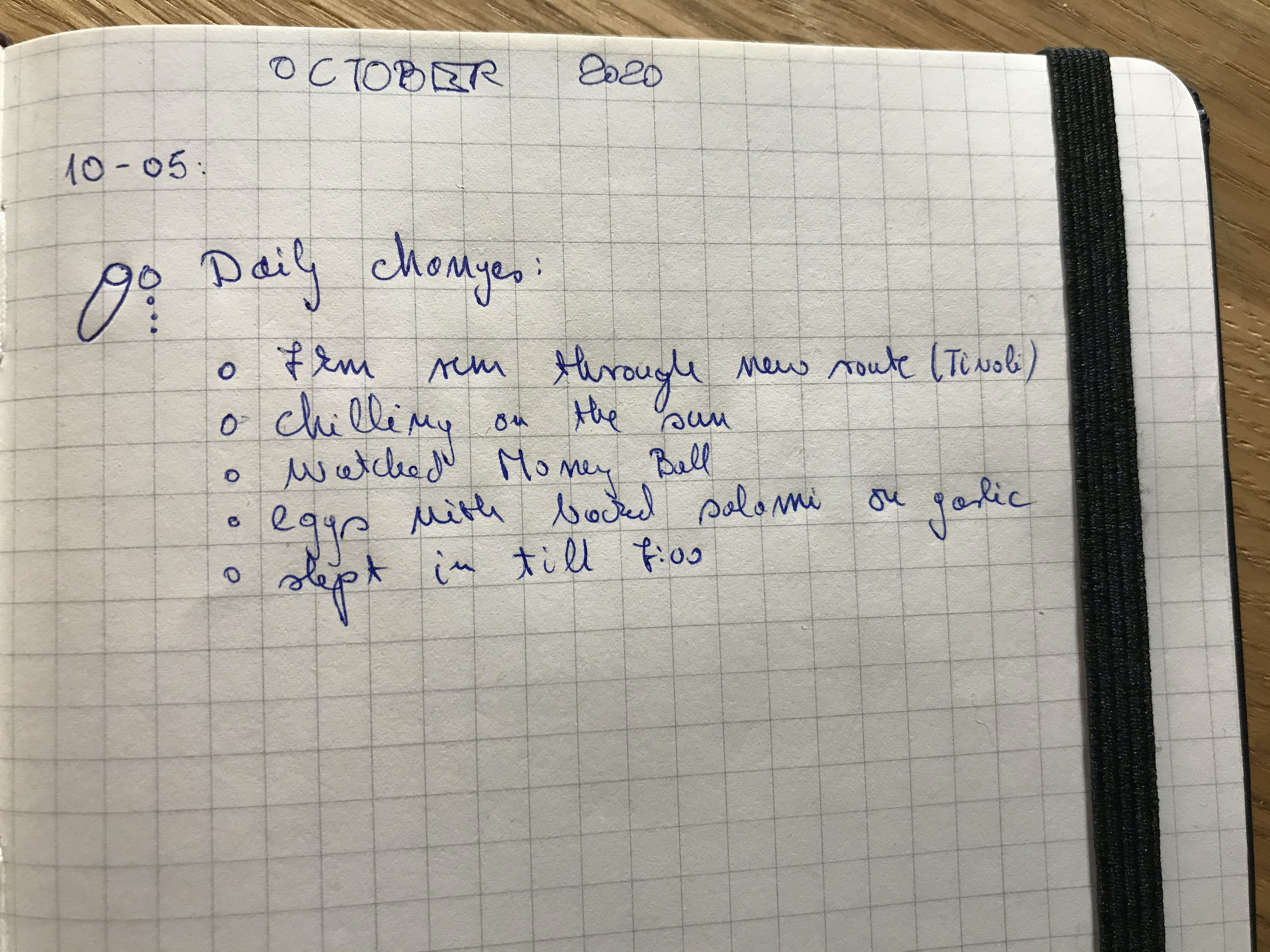 Pretty soon you'll see that you don't have to force yourself to try new stuff, but instead that you are thrilled of the idea of trying something new.Then once you get into the habit of tracking what you tried, you should start pushing out of the comfort zone. Come up with a completely new schedule for an otherwise boring day.A prime example are the changes I made to an otherwise regular workday. In the past my Tuesday (or any other workday) would look something like this:
Pretty soon you'll see that you don't have to force yourself to try new stuff, but instead that you are thrilled of the idea of trying something new.Then once you get into the habit of tracking what you tried, you should start pushing out of the comfort zone. Come up with a completely new schedule for an otherwise boring day.A prime example are the changes I made to an otherwise regular workday. In the past my Tuesday (or any other workday) would look something like this:- Wake up around 8:00.
- Roll out of bed and crawl into the shower.
- Breakfast and check emails.
- Drag/drive my ass to work.
- Work.
- Lunch.
- Work.
- Get home.
- Watch movies.
- Go to bed.
- 2h morning reading.
- Food market at 8:00 when the capital city is still sleeping.
- 1h morning writing in the Tea house to plan out the day and important tasks.
- PhD work.
- Evening run around a random lake:
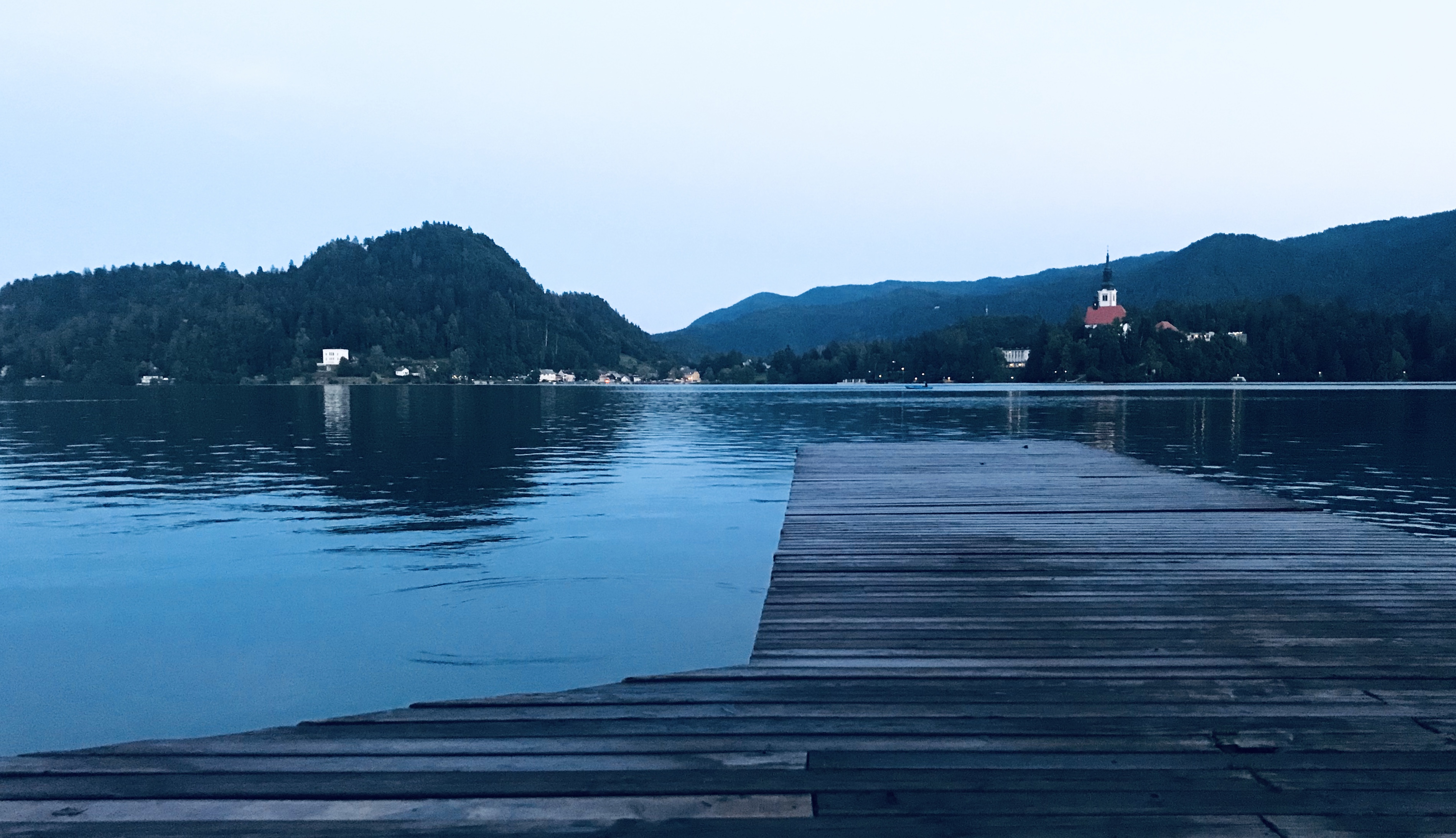
- Staying at the weekend house in the mountainside.
- Then back to work the next morning.
Why Daily experiments?
The whole point of this process is to figure out what you like and what you don't like. Then keep hammering down that process over and over again. Suddenly you'll end up with routines, habits, obligations, ... you like and a long list of things you don't like. A not-to-do list is as crucial as a to-do one 😉Just change something every day.That sounds way too easy. Well, it is. After all, simple stuff usually works. But the tricky part about small changes is that you don't see progress right away. You keep chipping and chipping away, then in two, three weeks or a month you start seeing substantial progress.If you need ideas about what to change, Google is your friend. If what you primarily need are changes in the productivity/time management sector, check the Make Time book. Written by two ex-google executives, it's an absolute treasure full of ideas. I wish every book I've read was written so well.So if you decide to dive into Daily experiments, create an excel/numbers table with rows for:- Date
- Daily changes
- Observations
- Things to try
Habit formation
If you've been reading my newsletter for a while, you know that I had some trouble with shifting my sleep schedule. But I kept digging, and I came across a new approach.For me, the whole point of the early morning is to do something that gets me energised for the day. This way, whatever happens throughout the day I at least started "well".Early mornings are something you can control in your life. You will rarely find peace outside the time when the rest of the world (OK, your part of the world) is asleep. Nobody expects you to answer your email/phone at 4:00 in the morning. If they do, change your boss/spouse or whoever bugs you.Mornings can be one consistent, calm thing in our hectic lives. Yet somehow I forgot why I used to wake as early as 4:00. So how did I switch back to 6:00 - 22:00? I came across Hal Elrod's book The Miracle Morning . Despite its cheesy title and promises that the book makes there's some wisdom in it.Hal talks a lot about affirmations, meditation, doing something for yourself in the morning, ... But the eye-opener for me was how he described the habit formation process.According to him, every habit formation has three phases:- Phase I [pain]: You don't want to do it, but you push through.
- Phase II [discipline]: It starts to get easier, but you still have to be careful not to slip.
- Phase III [Habit reinforcement]: Actual habit formation.
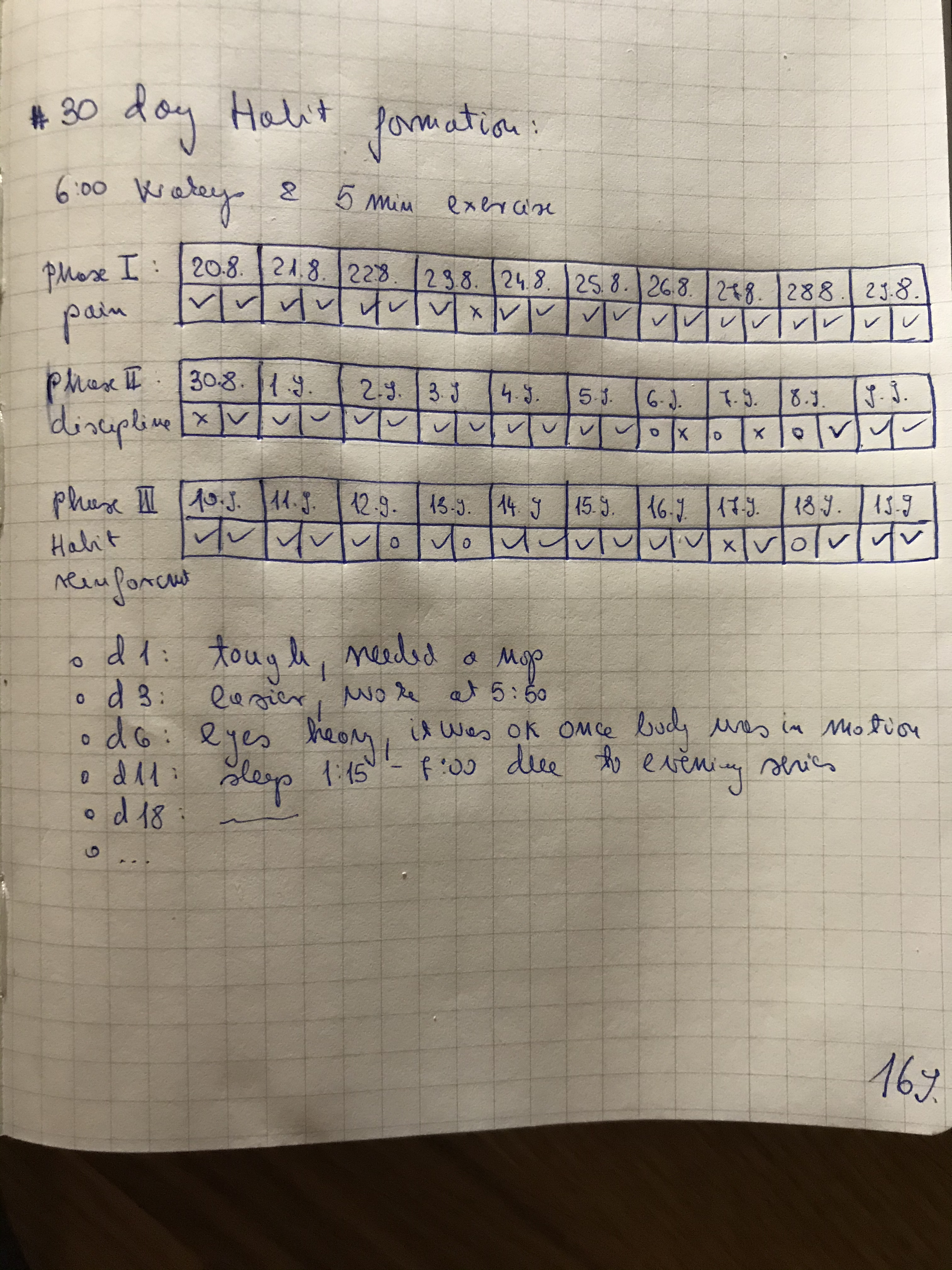 I wrote down what I noticed when I followed the process:
I wrote down what I noticed when I followed the process:- day 01: tough, needed a nap at 8:00
- day 03: easier, woke at 5:50
- day 06: eyes heavy, it was OK once the body was in motion
- day 11: sleep 1:15 7:00 due to evening series watching
- day 18: ...
- ...
Daily vacations
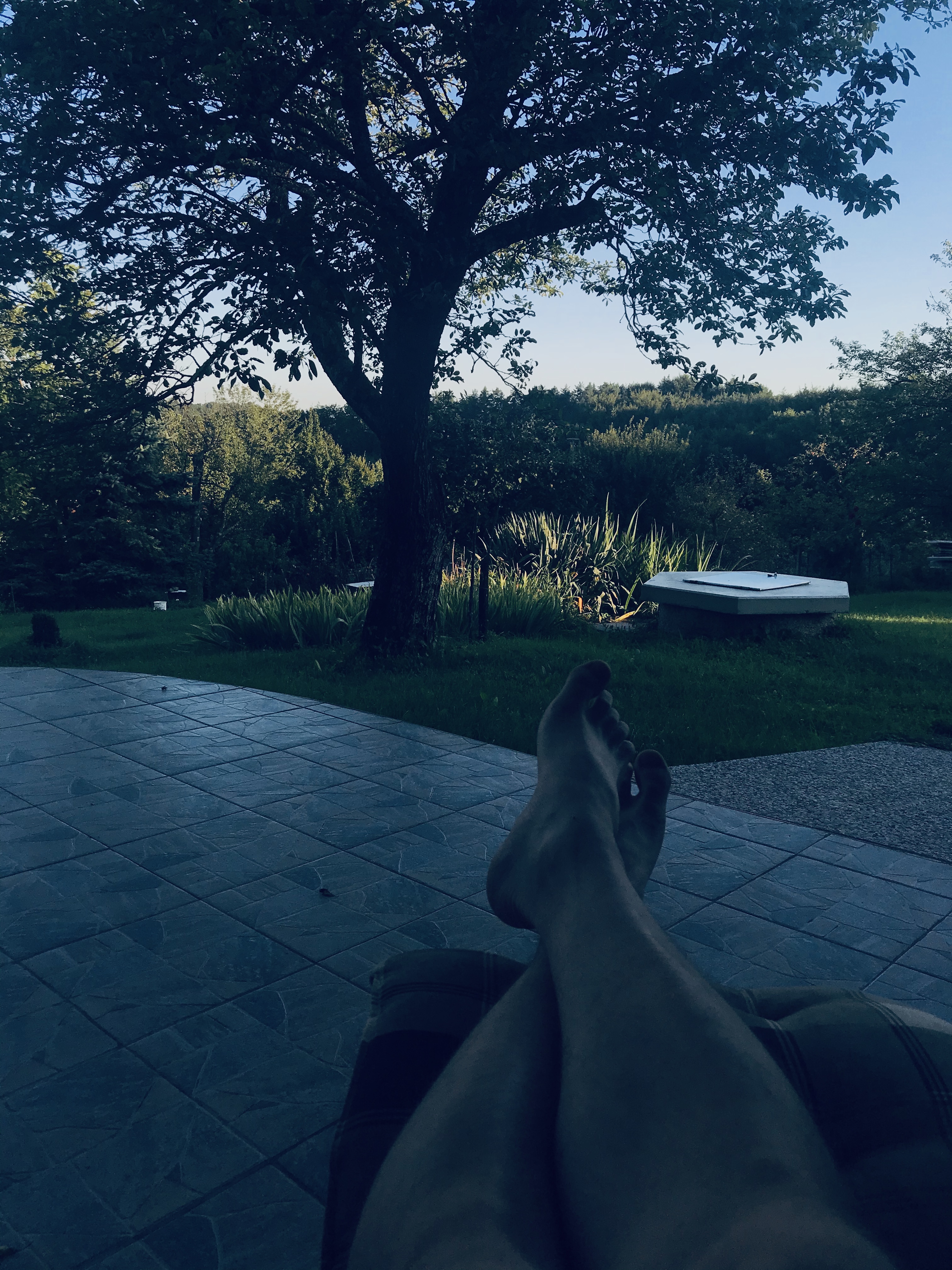 Did you ever finish your day and thought: "Shit, I was busy and active all the time, but what did I actually do?" Yup, we too often pick a task, and before we blink twice, we are on autopilot of our own life.We go to work, eat, go home, sleep, shit, f... Then repeat. You get the point.Nope, not for me. So what to do? We take time and pick a highlight for each day. We do something tiny each day that energises us.If you're a normal non-workaholic person (not a workaholic like I am), you're thinking: I'm doing this already. Favourite TV show, afternoon/morning short hike to a smaller hill, fill the blank, ... If you're already practising this, consider taking your breaks to the next level.The "mini-vacations" don't have to happen only in the morning. Do more than one each day. The sky is the limit. Though an afternoon trip to ISS is not yet on the table. Sadly 🙁I like to travel, but I have trouble getting out of my shell. So I rather stay home, read, write, and work in my comfort zone. This systematic daily vacation stuff is an attempt against my workaholism.If it wasn't apparent till now, I'm not into productivity/self-development just for the sake of getting more done but to spend as little as possible on "work" and spend the rest of the day doing things I enjoy.One example is the day I mentioned above with morning writing, food market visit, run around a lake in the mountainside. Why are days like these important? Besides the obvious that they do something for our mental sanity?They are an audition for the future where I'm enjoying the freedom of time, place and money. Such days are a test if I really want the life where I have the freedom to wake-up in the morning and book a ticket to New Zeeland for two weeks. Or better yet do a sleepover in London to see the latest James Bond premier.The point is I'm testing how the life that I aspire to live feels like. Is it worth working towards it? For now, I would say yes. I mean, I've been working towards:Life where I do research, travel, work and bankroll the whole thing with an online business.OK, I still need to make my first online dime, but I'm marching in the right direction (I think).You probably also have a dream. Are you living it? Or are you just daydreaming about it? Truth be told, wishful thinking alone doesn't get us to any of our goals. Action does.But how do we march towards what we aspire every day and not loose fate on the journey? We need to treat ourselves daily. Yup, to me the idea of 24 days of vacation a year and retirement at 70 as the only downtime doesn't sound too appealing. So I'm working to change that. What about you?That's it 🙂 Enough of my "wisdom" for this month. See you in the next Monthly experiment in November.Ziga
Did you ever finish your day and thought: "Shit, I was busy and active all the time, but what did I actually do?" Yup, we too often pick a task, and before we blink twice, we are on autopilot of our own life.We go to work, eat, go home, sleep, shit, f... Then repeat. You get the point.Nope, not for me. So what to do? We take time and pick a highlight for each day. We do something tiny each day that energises us.If you're a normal non-workaholic person (not a workaholic like I am), you're thinking: I'm doing this already. Favourite TV show, afternoon/morning short hike to a smaller hill, fill the blank, ... If you're already practising this, consider taking your breaks to the next level.The "mini-vacations" don't have to happen only in the morning. Do more than one each day. The sky is the limit. Though an afternoon trip to ISS is not yet on the table. Sadly 🙁I like to travel, but I have trouble getting out of my shell. So I rather stay home, read, write, and work in my comfort zone. This systematic daily vacation stuff is an attempt against my workaholism.If it wasn't apparent till now, I'm not into productivity/self-development just for the sake of getting more done but to spend as little as possible on "work" and spend the rest of the day doing things I enjoy.One example is the day I mentioned above with morning writing, food market visit, run around a lake in the mountainside. Why are days like these important? Besides the obvious that they do something for our mental sanity?They are an audition for the future where I'm enjoying the freedom of time, place and money. Such days are a test if I really want the life where I have the freedom to wake-up in the morning and book a ticket to New Zeeland for two weeks. Or better yet do a sleepover in London to see the latest James Bond premier.The point is I'm testing how the life that I aspire to live feels like. Is it worth working towards it? For now, I would say yes. I mean, I've been working towards:Life where I do research, travel, work and bankroll the whole thing with an online business.OK, I still need to make my first online dime, but I'm marching in the right direction (I think).You probably also have a dream. Are you living it? Or are you just daydreaming about it? Truth be told, wishful thinking alone doesn't get us to any of our goals. Action does.But how do we march towards what we aspire every day and not loose fate on the journey? We need to treat ourselves daily. Yup, to me the idea of 24 days of vacation a year and retirement at 70 as the only downtime doesn't sound too appealing. So I'm working to change that. What about you?That's it 🙂 Enough of my "wisdom" for this month. See you in the next Monthly experiment in November.Ziga
Get notified & read regularly 👇